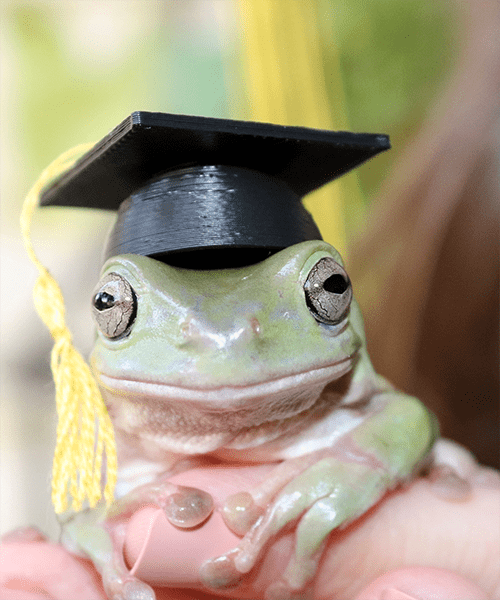
When it comes to intelligence, the animal kingdom boasts a wide spectrum of cognitive abilities. Frogs, with their unique physiology and behaviors, often leave us curious about their intellectual capabilities. In this article, we embark on a quest to unravel the mystery surrounding the intelligence quotient (IQ) of frogs. While frogs may not be renowned for their problem-solving skills like certain mammals, they exhibit fascinating adaptations and behaviors that showcase their own remarkable cognitive abilities.

What Is The IQ Of A Frog?
- Assessing Frog Intelligence:
Measuring intelligence in non-human animals can be challenging, as traditional IQ tests designed for humans are not suitable for other species. Intelligence in frogs is evaluated through a variety of methods, including observing learning capabilities, problem-solving skills, and behavioral adaptations.
- Learning Abilities:
Studies have shown that frogs possess a remarkable capacity for learning. Through associative learning, frogs can associate certain stimuli, such as sounds or visual cues, with specific outcomes. For example, they can learn to associate the sound of approaching danger with the need to seek shelter. This demonstrates their ability to acquire and retain information for survival.
- Problem-Solving Skills:
While frogs may not exhibit the same problem-solving skills as primates or dolphins, they do possess certain adaptive behaviors. For instance, some species of tree frogs demonstrate remarkable problem-solving abilities when it comes to navigating complex environments. They can utilize their specialized toe pads and climbing skills to overcome obstacles, demonstrating a level of spatial intelligence.
- Vocalization and Communication:
Frogs are known for their diverse vocalizations, which serve as a means of communication. The complexity and diversity of their calls can vary significantly across species. Some frog species possess a repertoire of calls, each associated with a specific context or purpose, such as attracting mates or defending territory. The ability to produce and interpret different vocalizations showcases a form of communication intelligence.
- Sensory and Environmental Adaptations:
Frogs have evolved a wide range of sensory adaptations that allow them to navigate their environments effectively. Their visual and auditory systems are finely tuned, enabling them to detect and respond to changes in their surroundings. Additionally, certain frog species display impressive camouflage techniques, blending seamlessly into their natural habitats. These adaptations demonstrate a level of environmental intelligence and the ability to survive and thrive in diverse ecosystems.
Determining the IQ of a frog is a complex task, as their intelligence manifests in unique ways. While frogs may not excel in traditional problem-solving tests, they possess specialized cognitive abilities that allow them to learn, adapt, and communicate within their environment. Their learning capabilities, problem-solving skills, vocalizations, and sensory adaptations highlight the fascinating intelligence embedded within these amphibious creatures. By appreciating and studying the cognitive abilities of frogs, we gain a deeper understanding of the diversity and complexity of intelligence in the animal kingdom.
Frog intelligence compared to other animals
Comparing the intelligence of frogs to that of other animals reveals intriguing insights into the diverse cognitive abilities across different species. While frogs may not possess the same level of complex problem-solving skills as some highly intelligent mammals, they showcase unique adaptations and behaviors that highlight their own form of intelligence. Let’s explore a few examples of how frog intelligence compares to that of other animals:
- Primates: Primates, such as chimpanzees and bonobos, are considered some of the most intelligent animals. They demonstrate advanced problem-solving skills, tool use, and the ability to comprehend abstract concepts. Compared to primates, frogs do not exhibit the same level of cognitive complexity, especially in terms of problem-solving and tool use.
- Dolphins: Dolphins are renowned for their high level of intelligence and social cognition. They exhibit self-awareness, complex communication skills, and can solve intricate tasks. Dolphins are known to learn and adapt to new situations quickly. In comparison, frogs have more limited cognitive abilities and do not display the same level of problem-solving or sophisticated social behaviors.
- Birds: Birds, particularly corvids like crows and ravens, have been found to possess remarkable intelligence. They exhibit tool use, problem-solving skills, and even show an understanding of cause-and-effect relationships. Some birds can even solve puzzles and demonstrate planning abilities. In contrast, frogs do not exhibit the same level of problem-solving skills or tool use. However, they showcase their own unique cognitive adaptations, such as vocal communication and environmental adaptations.
- Dogs: Dogs are well-known for their social intelligence and ability to understand human gestures and commands. They can learn and respond to a wide range of verbal and non-verbal cues, display empathy, and exhibit problem-solving skills in certain contexts. While frogs do not possess the same level of social intelligence or capacity for understanding human cues, they demonstrate their own form of environmental and sensory intelligence, allowing them to navigate their surroundings effectively.
It is important to note that intelligence is diverse and can manifest differently across species. Each animal has evolved its own unique set of cognitive abilities, adapted to suit their specific ecological niche and evolutionary history. Comparing intelligence across different species helps us appreciate the rich tapestry of cognitive diversity present in the animal kingdom and deepens our understanding of how various species interact with and perceive their environments.
Can You Buy Chinchillas In Australia?
Why Does My Poop Smell Like Cat Pee?
Why Do Cats Clean Themselves In Front Of You?
How Much Caffeine Does It Take To Kill An Elephant?
What Does Dreaming Of Copper Head Snakes Mean?
What Happened To Fred The Cockatoo from Baretta?
Is Chloe From Beverly Hills Chihuahua Still Alive?
Why Are My Cats Balls Black?
Turtles, Tortoises and Islam
Why Did Cate Wolfe Leave The Doctor Blake Mysteries?
What kind of cinnamon is safe for dogs?
Is Fairy Liquid Safe For Cats?
